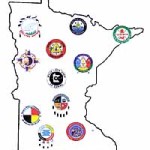A couple 8th grade students wrote to us, asking for information concerning the ICWA. This was my response…
———- Forwarded message ———-
From: Elizabeth Morris
Date: Thu, Mar 20, 2014 at 1:12 AM
Subject: The Indian Child Welfare Act (ICWA)
To:
Hello, Cecilia.
I am happy to help two students from northern Minnesota. I was raised in the Twin Cities and my husband, Roland John Morris, Sr., was a member of the Minnesota Chippewa Tribe – Leech Lake. He passed away in 2004.
Although he was born and raised near Cass Lake, spoke only Ojibwe until he started kindergarten, and was raised practicing many traditions, he was very opposed to tribal government control over him and his family. He believed that many tribal governments are deeply corrupt and are harming people more than they are helping them. He believed the Indian Child Welfare Act was particularly harmful to children and families – and was opposed to tribal government having any jurisdiction over his children or grandchildren.
He went to Washington DC many times to talk to Congressmen about how tribal governments were hurting people. The last time he went was just three weeks before he passed away. His doctor told him not to go, but it is what he wanted to do.
I will tell you what we know of the ICWA.
Almost twenty years ago, a six-year-old boy and his five-year-old sister searched for breakfast while the adults in the house slept off the previous night’s party. He was used to having to care for his four younger siblings. Many times it had been his job to keep them all in the bedroom while adults were enjoying themselves in other areas. During those frequent parties, according to the boy, they weren’t allowed out of the room except to go to the bathroom. Although He was enrolled in the first grade and his sister was enrolled in kindergarten, they rarely made it to school, their hair was infested with lice, and their parents sold the baby’s formula to support their drug habit.
On this morning, instead of finding cereal, the two small children found “long guns” in the cupboard. No, despite the behavior of the adults in his life, he didn’t shoot his sister. However, a social worker commented later that had these children been of white or black heritage, they would have been removed from that home a long time earlier. But because they were of Indian heritage, they were not allowed the same protection that other children would have received.
Thirteen years ago, a teenage girl from Leech Lake, angry at the world because she had been taken from a safe, happy home and placed with dangerous relatives because of the ICWA, went along with her boyfriend to do violence against the very people she loved most and felt safest with. http://www.startribune.com/local/190953261.html?refer=y
On June 11, 1999, a non-tribal mother was given 30 minutes notice to show up in Red Lake Tribal Court to defend her legal custody of her children. Not having any time to obtain counsel, she stood by helplessly as the court transferred physical custody of all three children to the man that had fathered the youngest two. The man, who was a tribal member, then turned around and obtained an order to forcibly remove her from the reservation. On June 13, she was served the order to get off the reservation and wasn’t given any time to return home to get clothes and possessions.
In November of 1999, an 8-year-old Brenda Swearington was beaten to death by her great uncle, whom she, along with her siblings, was placed with under the Indian Child Welfare Act. According to a court transcript, the uncle was quoted as saying, “I just lost my temper. Hit her, kicked her too hard when she wasn’t doing what she was supposed to be doing.” A witness stated having seen him pick the little girl up by her throat, “put her against the wall, let go of her, kicked her.”
According to the Native American Press, after the child’s death, other relatives begged the Leech Lake Reservation to pull out of the ICWA program, blaming the program’s priorities and staff for the little girl’s murder. One relative stated that if the ICWA staff had actually looked at the record of the great Uncle and Aunt, they should never have been chosen as caregivers.
Kayla, a fifth grader raised by her non-tribal aunt since she was 8 months old, wanted to stay in the only home she ever knew. She wanted to stay in Kentucky and continue with her basketball and cheerleading. But in 1994, the North Dakota Standing Rock Sioux Tribe sued. A reporter wrote for the Associated Press that the tribe was needed her because they were struggling to keep their cultural heritage and identity intact. In that same article, a representative of a group called NARF estimated that 1.96 million people of Indian ancestry live off the reservations. He said that puts the tribal courts at a disadvantage in custody cases. This is the true purpose of the Indian Child Welfare Act: to return children to the reservation for the tribal government’s benefit. All Kayla wanted was for life to go back to normal.
Around 1996, A young South Dakota mother was diagnosed with cancer. Wanting her three children raised in a better way than she had, she moved off the reservation and began going to a Christian church. Feeling so strongly about how destructive her life on the reservation had been, she refused to enroll her children or have them involved in tribal programs including “Head Start.” She also asked a friend to care for her children once she passed on. But before a legal will could be written, she died suddenly from a heart attack.
The State Court turned the children over to the tribe as mandated by the Indian Child Welfare Act, pulling them out of school and away from non-tribal relatives and friends and placing them into foster care on the reservation. Although an Indian/white couple that lived off the reservation was interested in adopting the children, the tribal court chose instead to leave them in a reservation foster home. During the process, a lawyer for the tribe confided that in this tribe of about five thousand members, they had about one thousand children in foster care.
On Jan 6, 2000 — more than 2 years from their first notice that “Carl” was living with non-Indians off the reservation — a tribal council voted to gain custody of the child, seeking to “protect his Native American heritage.” The tribal resolution indicated a transfer is more in the interest of the tribe than “Carl” when it stated; “Whereas, the Tribal Council has determined that there is no resource more vital to the continued existence and integrity of this Tribe than its children.”
However, the birth mother, an enrolled tribal member, voluntarily placed her baby in foster care with the county when he was 18 months old and told caseworkers she was opposed to her tribe’s intervention and that she had no ties to the tribe. The tribe subsequently declined jurisdiction, and continued to waive involvement over the next two years. The baby was placed in a white home. According to Carl’s custodial mother, “One problem we’re encountering is that when some of these people hear “ICWA” they just want to lay down and give up.”
This same scenario continues to be played out across America on a daily basis. Children who had never been near a reservation nor involved in tribal customs – including multi-racial children with extremely minimal blood quantum – have been removed from homes they know and love and placed with strangers chosen by tribal social services.
We hear story after story of children being used and abused by the system under the Indian Child Welfare Act, while tribal and federal authorities look the other way and pretend it isn’t happening. Everyone is too afraid to step on the toes of tribal government.
It is claimed that the Indian Child Welfare Act was passed in 1978 in effort to help prevent Native-American tribes and families from losing children to non-Native homes through foster care and adoption. We believe that was the story given to sell the bill to the American people, but evidence in the legislative record indicates that the real reason might have always been more about power and money than about helping kids.
The Act is now harming children all across the country as courts and tribes place culture and tribal sovereignty above children’s basic needs for permanency and stability.
1) Some Children have been removed from safe, loving homes and placed into dangerous situations.
2) Some families, Indian and non-Indian, have felt threatened by tribal government. Some have had to mortgage homes and endure lengthy legal processes to protect their children.
3) Equal opportunities for adoption, safety and stability are not always available to children of all heritages.
4) The constitutional right of parents to make life choices for their children including political associations has been interfered with.
5) The constitutional right for children of Indian heritage to enjoy Equal Protection has in some cases been denied.
Letters from tribal and non-tribal birth parents, extended family, foster parents and pre-adoptive families can be read at https://caicw.org/family-advocacy/letters-from-families-2/
The Indian Child Welfare Act of 1978 hurts children, parents, and caregivers. In addition to preventing children from getting the protection they need when they need it:
– Some Tribal governments have claimed jurisdiction over children that have little tribal heritage and are not enrollable according to their constitutions.
– Some Tribal governments have interfered in custody battles between parents, overturned county decisions in favor of the tribally enrolled parent and ignored child abuse, neglect and drug abuse in those decisions.
– Many county courts and social services back away when ICWA is involved because they can not afford to fight back.
– Several State Governments have given “Full Faith and Credit” to tribal courts and will not review or overturn tribal court custody decisions – no matter clear evidence of child abuse.
– This law requires Federal, State, and Tribal authorities to favor a child’s tribal heritage over their Irish, Afro-American, Scottish, Latino, or Jewish heritage, or any other heritage the child has, no matter the percentages.
We believe the Indian Child Welfare Act is blatantly unconstitutional – a violation of the 10th and 14th amendment. Supreme Court Justice, Clarence Thomas, intimated in a concurrence he wrote in June, 2013, that he believed it is unconstitutional as well. In agreement with the ruling in the case, “Adoptive Couple v. Baby Girl,” he wrote:
‘The ICWA recognizes States’ inherent “jurisdiction over Indian child custody proceedings,” §1901(5), but asserts that federal regulation is necessary because States “have often failed to recognize the essential tribal relations of Indian people and the cultural and social standards prevailing in Indian communities and families,” ibid.
However, Congress may regulate areas of traditional state concern only if the Constitution grants it such power. Admt. 10 (“The powers not delegated to the United States by the Constitution, nor prohibited by it to the States, are reserved to the States respectively, or to the people”).
The threshold question, then, is whether the Constitution grants Congress power to override state custody law whenever an Indian is involved.
(Side note: Justice Clarence Thomas’ concurring opinion cited the work of Rob Natelson, Senior Fellow in Constitutional Jurisprudence, Independence Institute & Montana Policy Institute. Rob Natelson was a friend to my husband, Roland.)
Dr. William B. Allen, Emeritus Professor, Political Science, MSU and former Chairman of the U.S. Commission on Civil Rights (1989) also stated about the Indian Child Welfare Act:
“… we are talking about our brothers and our sisters. We’re talking about what happens to people who share with us an extremely important identity. And that identity is the identity of free citizens in a Republic…”
Thank you so much for writing to us to ask about the Indian Child Welfare Act. I hope what I have shared here is helpful. If you have additional questions, please feel free to ask.


